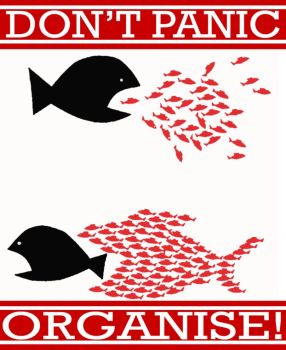 Ned K. 9 July, 2019
Ned K. 9 July, 2019VANGUARD - Expressing the viewpoint of the Communist Party of Australia (Marxist-Leninist)
For National Independence and Socialism • www.cpaml.org
For three or four decades now, the corporate mass media on behalf of big business gleefully reports of the reduction in the percentage of workers who are members of a trade union. They have had willing partners in the attack on workers' collective organisations from both Liberal and Labor Governments at both federal and state levels.
From the attack on the workers at Dollar Sweets, on meat workers in the NT and the deregistration of the BLF in the 1980s, to the ALP's non-union collective bargaining laws in the early 1990s , to the Howard Government's Work Choices, to Rudd and Gillard's Fair Work Act (Work Choices Lite) to the current Morrison Government's dishonestly named Ensuring Integrity Bill give the appearance that big business is in the box seat in the struggle between capital and labor.
However this is not the case. Despite the decline of union membership during the last forty years, workers and their unions and communities continue to struggle and win significant victories. The attempt by the Howard Government to wipe out the collective strength of the maritime workers and their union, MUA, in 1997-98 was defeated by the struggle of maritime workers and solidarity of other unions and working class communities.
In 2007, the Your Rights At Work, Worth Fighting For campaign saw the combined strength of workers, their unions and communities throw out of parliamentary office the reactionary Howard Government and the hated Australian Workplace Agreements (individual contracts)
In more recent times, workers from many different backgrounds and occupations came out in their thousands in support of construction worker Ark Tribe who stood up to the intimidation and coercion of the Australian Building and Construction Commission.
In the lead up to the federal election this year, hundreds of thousands of workers in capital cities and regional centers took to the streets as a class to demonstrate their collective resistance to attacks on their rights at work and living standards.
These are just the expressions of working class struggle and strength on what could be called the macro level.
On a smaller or micro level there are a many, many collective actions by workers across a range of industries. For example the strike action of child care workers over the last year, the massive teachers' strike in SA this week for decent work and increased wages, the Longford workers' resilience in strike action lasting over two years. Then there are the collective actions of workers in particular workplaces that are never reported in the mass media. For example contract cleaners at Red Cross Blood Centers taking action and winning job security at change of cleaning contract, pharmacy workers through industrial action winning better pay and conditions in a new collective agreement.
A common thread of all these struggles are three elements that big business and their politicians can never wipe out, despite what laws they bring in.
These elements are -
1. Workers know the value of strength in numbers
2. Workers in struggle find leaders and leader networks that they trust
3. Workers use the power of collective action and work out who are their enemies and who are their friends.
Progressive leaders within unions understand these elements and encourage and assist workers' independent capacity to fight regardless of what happens in parliament.
One union leader after the federal election defeat of the Labor Party stated publicly that workers want unions that build workers' collective organisation and strength and who campaign to win workers' demands. Rather than unions being the "campaign arm" of the Labor Party each election time.
Workers seeing the importance of strength in numbers is why they vote for amalgamations of unions such as the CFMEU amalgamating with the MUA and the likely amalgamation of two largely "non trades" unions, the United Voice and the National Union of Workers.
Is It Terrible Or Is It Fine?
Many years ago in the beginnings of the Chinese Revolution against feudalism and imperialism, a young Mao Zedong wrote an article about the peasants who were forming their own associations and taking collective action against oppression. He asked whether this was "terrible" or "fine" and said it was "fine" at a time when there was some doom and gloom amongst some comrades.
In Australia, the mass media try to build a narrative that there is no hope in collective action for workers. They should forget unions and the collective as a thing of the past.
However their message is not sinking in and workers, rather than give up, are continuing to find ways to struggle and win.
The future is bright!